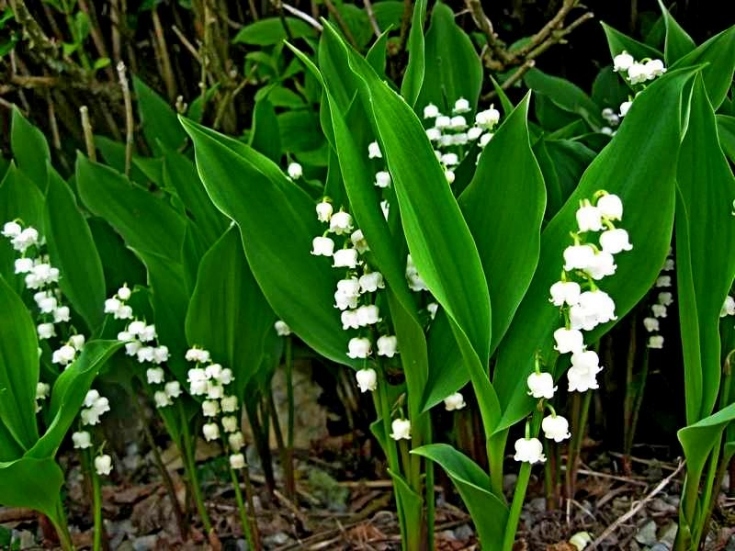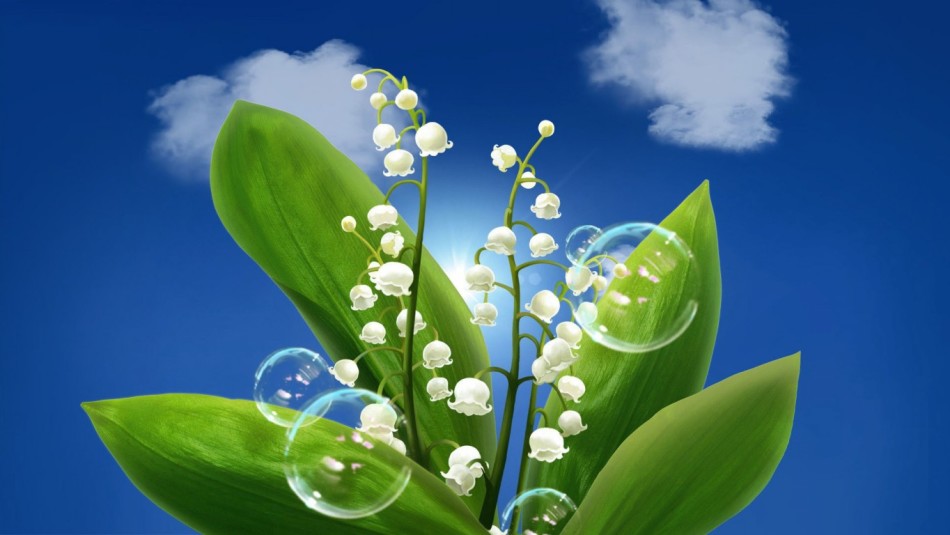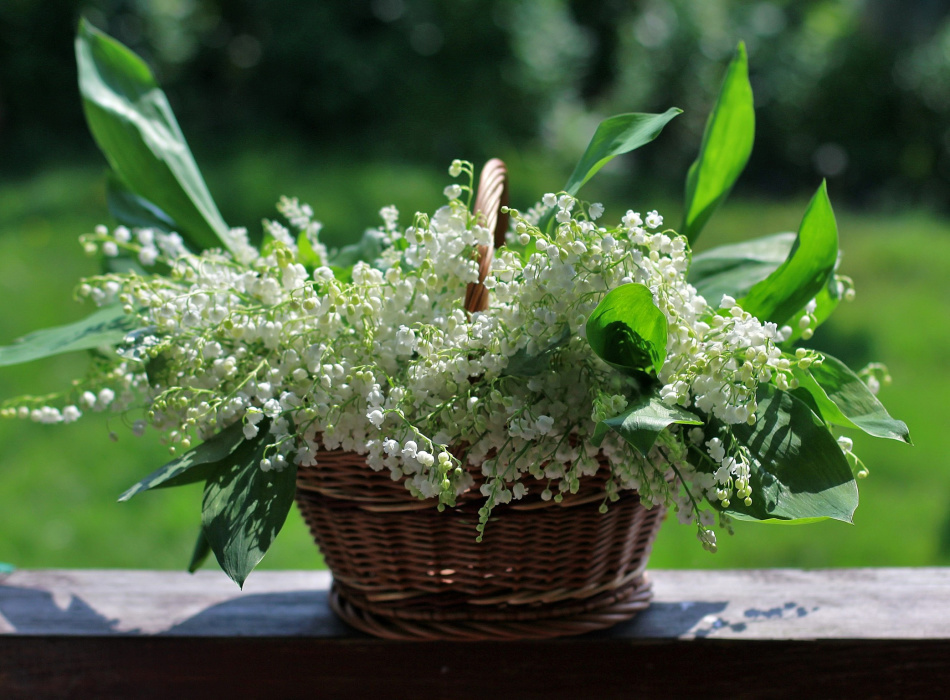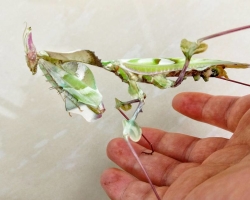Detailed information about the valley.
Content
- Where are lily of the valley?
- Lily of the valley: Description
- Video: Details about the valley of the valley
- What does the valley look like, how many leaves do he have?
- Video: A selection of beautiful lilies of the valley
- Когда всходят ландыши и распускаются в лесу
- When does the valley bloom, in what month?
- How much lilies bloom?
- Riddles about the valley for children
- Video: What does the valley look like and bloom?
Remembering the lily of the valley immediately you feel its unique aroma. Small bells-flowers are gently staggering on a thin leg-stab, like creating a special chime with aroma.
Where are lily of the valley?
Lily of the valley - perennial plants of the family of asparagus. However, this specific flower changed its affiliation four times.
First, thanks to the name Lilium convallium, this plant was attributed to the Liley family. Later, in connection with the monotype of the plant, that is, the composition of the genus only from one species, it was allocated to the Landyshev genus. Since 2003, the valley in the Iglitsev family, and since 2013 - asparagus.
In nature, the valley grows in Europe, Asia, North America. As a rule, the habitat of this forest flower is deciduous, pine, mixed forests, thickets of shrubs, oaks, slopes of mountains, edges and clearing. In the spring, they bloom especially well in fairly moist places with loose soil, not oversaturated with humus.
The young man is popular as a decorative flower in the garden and in flower beds. Since this flower is forest, it tolerates unpretentious conditions very well. The best places for their distribution will be arelas under the trees, bushes in the shade.

But in a large shadow it will be weak. It is worth remembering that the lily of the valley grows very quickly and can quite easily supplant other flowers in the neighborhood. Periodic top dressing with organic fertilizer is desirable. A fairly frost -resistant plant and additional special care in preparation for winter does not need. In one place can grow up to 10 years.
Lily of the valley: Description
The valley is a perennial, herbaceous, quite unpretentious plant. It reaches a height 20-25 cm, the root system is creeping, which carries several small lower leaves.
These leaves are followed by two, less often three, oblong-elliptical full-fledged pointed sheets. A thin, ill -faced, erect peduncle stem comes out of his corner. At the end of the stem there is a brush with 6-20 flowers, usually deployed in one direction.
Flowers In the shape of bells 4 mm long and 5 mm wide with six curved pale white teeth with a pronounced unique aroma. At the end of flowering, the flowers darken and an ovary appears in their place - the fruits of the valley.

Fetus -Orange-red berry in a diameter of about 6 mm., Which contains one or two seeds. The liliacies fruit fruit in June-July and these berries remain on the stem for a long time.
It should be remembered that fruits and flowers are poisonous. The plant contains a special component - hardening. Therefore, it is not recommended to collect flowers to children, and it is advisable for adults to wash their hands after collecting them.
There are cases of severe poisoning of children with berries of this plant. It is also not advised to leave a vase with flowers in the room where you sleep - you may get your head.

The fruits of lilies of the valley are poisonous
The valley of the valley propagates both the rhizome and seeds. When propagated by seeds, the plant will bloom already in the seventh year. With roots, any other cultivated plants in the garden or in a flowerbed can very quickly displace. Therefore, the Areol of their increase should be protected by a dug board.
The valley is a medicinal plant. All its parts are harvested - leaves, flowers, stem. For medicinal purposes, this is a wonderful means of strengthening the cardiovascular system.
Video: Details about the valley of the valley
What does the valley look like, how many leaves do he have?
The valley is a relatively low plant. The most common variety is May. Its shoots reach 18, maximum - 30 cm. The leaves are longitudinal, smooth, plain, about 10 long and about 5 cm wide.
As a rule, sheets are two, less often - three. A long trihedral stem comes out of the lower base of the leaves, at the end of which there are bright white flowers, with inclined heads in the shape of bells.

However, others are also known, less popular, but still decorative subspecies. First of all, the form of convallária albostriata should be highlighted. This variety differs from the traditional May lily of the valley with a striped color of the leaves. Flowers, at the same time, retained a traditional white color and typical shape.
While the type of Convallária Flore Plena has an original format of velvety inflorescence of white color. It is a kind of variety Convallária Rosea. With ordinary forms of the leaf and flower, the inflorescence has a pale pink color. Convallaria Transcaucasica has a larger shape of the flower.
Video: A selection of beautiful lilies of the valley
Когда всходят ландыши и распускаются в лесу
Both in the wild and in the garden, in the flower beds, the valley of the valley move in early spring. The leaves break into thin stems twisted into a tube. Over time, the leaves straighten out and the stem is growing between them. At its end, the beginnings of the flowers are formed. Which will bloom in the middle of May - early June.
When does the valley bloom, in what month?
Being a perennial plant, lily of the valley bloom every year. Landysh flowering time - from May to June. In medium latitudes, the bloom of the valley is observed even in April. This happened after climatic changes, now the inhabitants of the middle strip of lily of the valley are wounded before everyone else.
How much lilies bloom?
The valley bloom from 10 to 20 days, depending on climatic conditions. On each twig, on average there are 5-10 flowers. But there are especially magnificent plants on which there can be as many as 20 beautiful fragrant bells.

We remind you that you should be very neat with these plants, because their beauty is deceiving. And if you saw red berries after flowering, then in no case do you need to tear them off - the fruits of the valley are very poisonous.
Bright berries are especially attracted to inquisitive children, so be on the alert so that your baby does not eat the berry, as this is fraught with very serious consequences.
Riddles about the valley for children
Bells-meshs on a thin leg
So fragrant and fragile very
In a wide sheet, as in a branch
They hide the head from the sun in the shade.
Small beads pull the stem to the ground
White bells hang on a thin stalk
Leaflets are large, green.
The stem is fragile, thin,
And the flower is fragrant, white.
Gentle bells in the forest - gentle,
Like snowflakes.
They rest in the green sheet,
The drunk spring smell is fragrant.

The valley is a beautiful and delicate flower that grows in many latitudes. But beauty, as you know, is deceiving, so be careful with a flower and especially with berries. It is best to watch beautiful lawns from the side and do not carry bouquets into the house.







